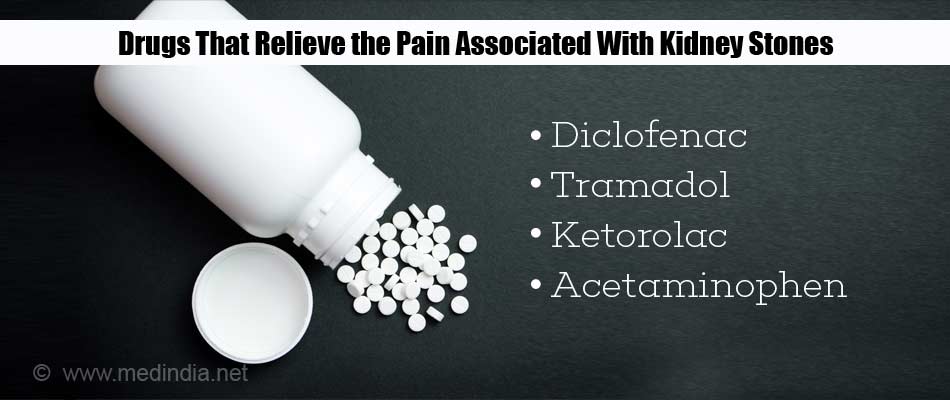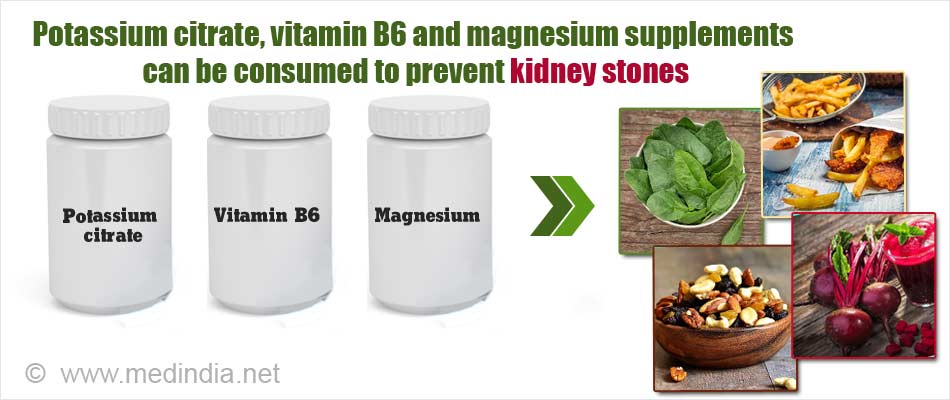- Kapoor D, Vyas RB, Dadarwal D (2017) Nephrolithiasis - An updated Review in Relation to Diagnosis, Prevention and Treatment J Trans Med Res 1(2): 00009. DOI: 10.15406/oajtmr.2017.01.00009
- Callaghan D, Bandyopadhyay BC (2012) Calcium Phosphate Kidney Stone: Problems and Perspectives. Anat Physiol 2:e118. Doi: 10.4172/2161-0940.1000e118
- Intake of Vitamins B6 and C and the Risk of Kidney Stones in Women. GARY C. CURHAN, WALTER C. WILLETT, FRANK E. SPEIZER and MEIR J. STAMPFER. JASN April 1, 1999 vol. 10 no. 4840-845.
- Davenport K, Waine E. The Role of Non-Steroidal Anti-Inflammatory Drugs in Renal Colic. Pharmaceuticals (Basel). 2010 May; 3(5): 1304–1310. Doi: 10.3390/ph3051304
- Harrison’s Principles of Internal Medicine 19th edition
Drugs for Kidney Stones
Drugs for kidney stones are used to treat the acute symptoms like pain caused by the stone and also to prevent new stones from forming. Kidney and other urinary tract stones are a common problem that can affect individuals of all age groups. Urinary tract stones cause pain. Their passage through the ureters causes severe spasmodic pain, which is an attempt by the urinary tract to expel the stone.
Kidney stones also cause symptoms of nausea, vomiting and blood in the urine. They may obstruct the flow of urine through the urinary tract resulting in swelling of the kidney (a condition called hydronephrosis), kidney infection and chronic kidney disease. Early treatment is necessary to relieve symptoms and prevent long-term damage.
Kidney stones vary according to their chemical composition. Calcium oxalate stones are the most common type, followed by calcium phosphate, uric acid, struvite / triple phosphate stones and cystine stones. Some stones can be mixed.
Smaller stones may be expelled spontaneously by the urinary tract and medical treatment helps to relieve symptoms, dissolve the stone and assist in its expulsion. Larger stones require surgical treatment. The introduction of minimally invasive surgeries has almost eliminated the need for open surgeries.
What are the Common Medications used to Treat Kidney Stones?
Drugs used to treat kidney stones can be classified based on the role they play in the treatment of kidney stones:
Drugs that relieve the symptoms such as Pain and Vomiting or Nausea Caused by Kidney Stones:
These include:
- Painkillers
- Antiemetics
Painkillers: Painkillers are used to relieve the pain associated with the kidney stones. These include:
NSAIDs (Non-steroidal anti-inflammatory drugs): NSAIDs like ibuprofen, diclofenac, naproxen, indomethacin and ketorolac block an enzyme called cyclooxygenase, which mediates the production of chemicals in the body called prostaglandins. By preventing the production of prostaglandins, these drugs bring about the following effects in patients with kidney stones:
- They reduce the swelling and inflammation caused by the stone in the ureters
- They reduce the formation of urine, thereby resulting in less pressure on the stone from above
- They cause direct relaxation of the muscles of the ureters
Acetaminophen can also be used for mild-to-moderate renal colic (abdominal pain due to kidney stones). It does not have an anti-inflammatory effect, but has the advantage that it can safely be used during pregnancy.
The oral medications take some time to act, and people with renal colic may vomit out the medication. The medications are sometimes administered as an injection or through the rectum. Side effects of these drugs include irritation of the stomach and bleeding from the digestive tract. Since they reduce urinary filtration, they carry a risk of acute kidney failure, especially in patients with pre-existing kidney disease, dehydration, cirrhosis, or those who are on other kidney-damaging drugs.
Opioids: Opioids or narcotic painkillers like morphine and tramadol also relieve pain. They provide quick relief but should be used with caution by health professionals due to their adverse effects like sedation, vomiting, respiratory depression and a potential for abuse.
Antiemetics: Drugs like metoclopramide may be used to treat nausea and vomiting if necessary, especially with opioids. However, in most patients, the vomiting subsides once the pain is relieved.

Drugs that help to expel kidney stone: Smaller stones, especially those lesser than 10 mm in diameter and located lower down in the urinary tract, often undergo spontaneous expulsion. Medical expulsive therapy (MET) includes a group of medications that help in the elimination of the stone. These may include an alpha blocker like terazosin or a calcium channel blocker like nifedipine, a corticosteroid like prednisone, an NSAID, an antiemetic, and/or and an opioid painkiller as needed for short durations of 5 to 10 days.
- Alpha adrenoceptor blockers: Alpha adrenoceptor blockers like terazosin or tamsulosin relax and relieve the spasm of the muscles of the lower urinary tract. They reduce the pain and help in the expulsion of the stone.
- Calcium channel blockers: Nifedipine is a calcium channel blocker that is used for cardiovascular conditions like hypertension and angina. It relaxes the smooth muscles of the urinary tract and facilitates expulsion of the stone. It can be used as an alternative to terazosin and tamsulosin or used in combination.
- Corticosteroids: Corticosteroids like prednisone are potent anti-inflammatory drugs and reduce inflammation associated with urinary stones. However, they do have side effects, especially when used over prolonged durations and should be used with caution.
Drugs used to Dissolve the Kidney Stones / Chemolytic Treatment
Chemolytic treatment is the administration of specific solutions into the urinary tract to dissolve the stones. The solution is either locally introduced percutaneously (through a nephrostomy tube) or given orally. If given as a local irrigation, the patient should have at least two nephrostomy tubes or one nephrostomy tube and a ureteric stent to ensure that excess pressure does not build up in the kidney. Local irrigation is rarely done nowadays. Potassium citrate given orally after short wave lithotripsy or percutaneous nephrolithotomy helps to dissolve the small stone particles and prevent recurrence of the stone.
Drugs used to Prevent Kidney Stone Formation
Once a stone has formed the chances of a second stone forming in the kidney is almost 50%. Underlying conditions that can promote stone formation include primary hyperparathyroidism and distal tubular acidosis and these should be treated with appropriate medications to prevent kidney stone formation. Drugs used to prevent specific types of kidney stones include the following:
For Calcium Stones:
- Thiazide diuretics: Thiazide diuretics like hydrochlorothiazide are water pills that cause excess loss of water through the urine. Unlike other diuretics, they reduce calcium excretion in the urine, and thus reduce the chances of calcium stone formation. Studies have indicated that they reduce the recurrence of calcium oxalate stones by 50%. They can be used in a condition called idiopathic hypercalciuria, characterized by high calcium levels in the urine.
- Potassium citrate: Intake of potassium citrate alkalinizes, and increases excretion of the citrate in the urine. The citrate combines with calcium and maintains it in a soluble form, thereby preventing the formation of calcium phosphate and calcium oxalate crystals, which otherwise aggregate to form stones. The potassium from potassium citrate also replaces the potassium loss caused by thiazides when the drugs are given together. Since potassium citrate increases the pH of the urine, it could also promote the formation of calcium phosphate stones.
- Vitamin B6 or Pyridoxine: Urinary oxalate is important in formation of calcium oxalate stones. The recommended daily allowance (RDA) for vitamin B6 is 2 mg/day, however in many studies it has been seen that when higher doses of over ≥40 mg/d are included the risk of stone formation is less.
- Magnesium: Magnesium can greatly reduce the recurrence rate of calcium oxalate kidney stones. Magnesium acts by binding to oxalate in the digestive tract and thus inhibits the formation of calcium oxalate crystals in urine. Most studies have found that higher urine concentration of magnesium is significantly correlated with lower urine oxalate.
When Should You Take Potassium Citrate, Magnesium and Vitamin B6 Tablets or solution?
It is best to consume potassium citrate, vitamin B6 and magnesium at the time when oxalate-containing food is present in the digestive tract. Hence, it is advised that these should be consumed at the time of having meals to give the best long term outcomes of preventing stones.

Drugs like orthophosphate and sodium cellulose phosphate have been used to prevent calcium stones. However, thiazides are preferred because they are effective and have a better safety profile.
For Uric Acid Stones:
- Potassium citrate or Bicarbonate salts: These help in the alkalization of urine and improve the solubility of uric acid in the urine. Thus, they prevent stone formation.
- Allopurinol or Febuxostat: Allopurinol and febuxostat are drugs that block the enzyme xanthine oxidase and therefore reduce the formation uric acid. They reduce the level of uric acid in the blood and the urine and are therefore useful in the prevention of uric acid stones. Allopurinol has also been found to reduce calcium oxalate stones in patients with high uric acid in the urine.
For Cystine Stones:
- Potassium citrate: Potassium citrate increases the citrate excretion in the urine, alkalinizes the urine and increases the solubility of cystine in the urine.
- D-penicillamine or Tiopronin: D-penicillamine is a drug that binds to cystine in the urine, resulting in the formation of soluble compounds. It is associated with several side effects like those related to the digestive tract like diarrhea and loss of taste, skin reactions, neurological adverse effects and reduced blood counts. Tiopronin is a newer option with lesser side effects, but its efficacy may be less than d-penicillamine.
For Struvite Stones:
- Antibiotics: Antibiotics may be used to treat urinary tract infection associated with struvite stones. The choice of the antibiotic depends on the results of a urine culture and sensitivity test.
- Acetohydroxamic acid: Struvite stones are formed when bacteria that produce urease in the urinary tract break down urea to produce ammonia, which increases the pH of the urine. Acetohydroxamic acid inhibits the urease enzyme and therefore prevents struvite stone formation. It is used in some cases of recurrent urinary tract infection like in patients with spinal cord injury. Its use otherwise is limited due to its adverse effects like digestive tract disturbances, and psychiatric, skin and blood-related side effects. It should not be used in pregnancy and with alcohol.







